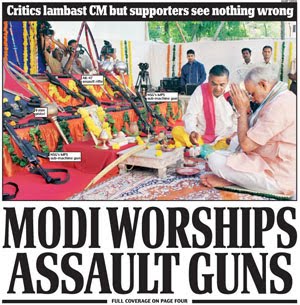



Gujarat Chief Minister Narendra Modi, who on Friday was annointed as prime ministerial candidate of the Bharatiya Janata Party at its parliamentary board meeting, has become the most searched person on google.
According to reports, Modi has pipped American President Barak Obama to become the most searched person on the internet search engine.
Modi is expected address his first rally in Haryana's Rewari on Sunday as the BJP's prime ministerial candidate for the 2014 general elections. He will target the UPA government on national security in the public meeting.
Modi is pretty aware of the importance of social media in creating awareness among voters in the country.
The Gujarat chief minister's tweets now also appear in Punjabi and languages and dialects of the seven North-Eastern states. Cunnrenty, his tweets are available in Hindi, Urdu, Kannada, Marathi, Malayalam, Odia, Tamil and Bengali and some others.
Modi's followers on Twitter handle @narendramodi numbered 2,206,260 on August 30.
This is not all. His social media team is set to float websites on Gujarat in over 50 languages.
Read more at:
http://indiatoday.intoday.in/story/narendra-modi-pips-obama-to-become-most-searched-person-on-google/1/309910.htmlUSA banned anti-Muslim Indian leader named PM candidateAHMEDABAD, India — India’s leading opposition party on Friday officially anointed a prominent Hindu nationalist, considered one of the most divisive politicians in Indian history, as its candidate for prime minister in next year’s national elections.
The politician, Narendra Modi, chief minister of the western state of Gujarat, became the Bharatiya Janata Party’s choice to lead it against the Indian Congress Party and its governing United Progressive Alliance, which is now led by Prime Minister Manmohan Singh and the party president, Sonia Gandhi, scion of India’s first family of politics.
Mr. Modi sits astride deep fissures in India’s polyglot society, with many ethnic fault lines that sometimes explode into violence. He is widely despised by Muslims here for the role he played in the 2002 Gujarat riots, when more than 1,000 people, mostly Muslims, were killed in brutal attacks that led babies to be impaled and women to be thrown alive onto burning pyres.
But in the 11 years since, Mr. Modi has sought to recast himself as a development expert who is able to cut through India’s infamous layers of bureaucracy and create jobs and wealth.
In a society that values family ties above all, he is a single man without children, which makes him seem incorruptible to many. And as the governing alliance is increasingly consumed by corruption scandals and a worrisome economic slide, Mr. Modi’s qualities as leader of an economically vibrant state have endeared him to the country’s aspiring and largely urban middle class.
Whether this middle-class embrace is enough to propel him to national leadership is unclear. India’s electorate is still overwhelmingly poor and rural, and the Congress Party has long courted such voters with welfare programs like guaranteed jobs and subsidized food. India’s minorities, including Muslims and Christians, make up nearly 20 percent of the country’s population and are likely to vote overwhelmingly against Mr. Modi — a challenging hurdle to overcome.
This challenge is one reason that leading members of the Bharatiya Janata Party have resisted for months naming Mr. Modi as its official candidate for prime minister, and one top leader continued that resistance Friday.
But Mr. Modi’s fiery oratory and unusually combative campaign style have long resonated with his party’s most enthusiastic supporters, who have become increasingly insistent that he be the party’s candidate.
“There is no other leader in the B.J.P. who creates anything like the enthusiasm that Modi does,” said Pralay Kanungo, a professor at the School of Social Sciences at Jawaharlal Nehru University in New Delhi.
Mr. Modi, who turns 63 on Tuesday, is almost a generation younger than the founding members of his party. And some of his views, including an embrace of foreign investment, contrast with a traditional economic nativism that runs deeply through his party. How those divergent views may be reconciled remains to be seen.
Mr. Modi and his party advocate a tougher policy against Pakistan, India’s longtime rival and occasional wartime enemy.
http://www.nytimes.com/2013/09/14/world/asia/polarizing-nationalist-to-lead-opposition-in-indian-elections.html